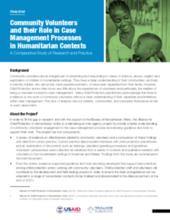Background
Community volunteers are an integral part of preventing and responding to cases of violence, abuse, neglect and exploitation of children in humanitarian settings. They have a deep understanding of their communities, and help to identify children who are at-risk, have experienced harm, or have been separated from their family. However, Child Protection actors often know very little about the experiences of volunteers and particularly the realities of being a volunteer involved in case management.1 Many Child Protection practitioners acknowledge that there is a reliance on the work of community volunteers without a clear understanding of their capacities and limitations within case management. This lack of analysis can put children, communities, and volunteers themselves at risk or even cause harm.
About the Project
In order to fill this gap in research and with the support of the Bureau of Humanitarian Affairs, the Alliance for Child Protection in Humanitarian Action is undertaking an inter-agency project to provide a better understanding of community volunteers’ engagement in the case management process and develop guidance and tools to support their work. The project has two components:
- A review of evidence on effectiveness related to community volunteers and a comparison of these findings with data from current practice. Current practice data included interviews with child protection practitioners and an examination of documents such as trainings, standard operating procedures and guidelines. Volunteers’ perspectives were collected via narratives from a variety of contexts and qualitative research with volunteers in four humanitarian settings in Myanmar and Malawi. Findings from this study are summarized in this brief document.
- From the review, evidence-supported guidance and tools are being developed that support best practices among child protection actors working with community volunteers. Child protection staff and volunteers will contribute to the development and field-testing process in order to ensure the tools and guidance can be adapted in a range of humanitarian contexts (to be finalized and disseminated to the Alliance partners at the end of 2021).
Additional Resources:
- Exploratory Study Report | Community Engagement in Case Management: The full research report with the findings and recommendations for child protection actors in humanitarian settings. (Only available in English)
- Study Brief | Community Engagement in Case Management: A 5-page document that summarizes the findings and recommendations for (Available in English, Arabic, Spanish, French)
- Policy Brief | Community Engagement in Case Management: A 3-page document targeting donors, policy makers, and UN agencies regarding the roles of volunteers and how decision makers can support their roles (Available in English, Arabic, Spanish, French)
- 7 Best Practices to Support Community Volunteers: A poster for Child Protection teams to emphasize the evidence based practices of engaging volunteers that were documented in the research (Available in English, Arabic, Spanish, French)
To watch the virtual launch of the Community Engagement in Case Management Study, click here.

